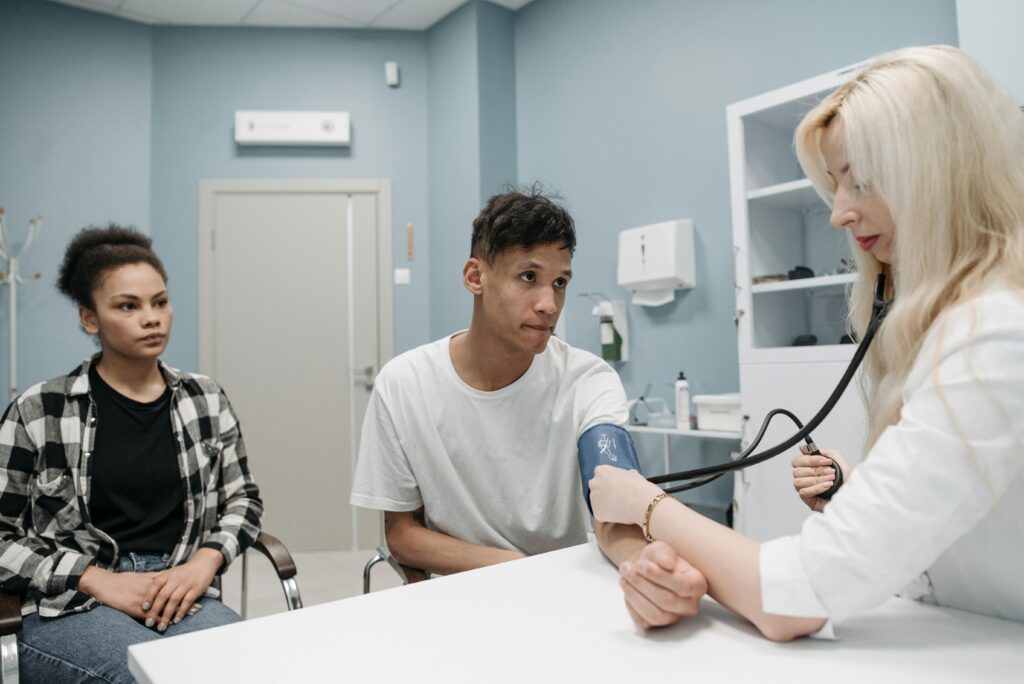‘Community Health Detailing’ taps the power of personal connection to transform care.
Never underestimate the power of relationships.
Pharmaceutical companies first used one-on-one conversations with doctors to weave their products into the doctors’ everyday prescribing habits. Now social-medicine advocates are adapting the same technique to improve upstream care for our neediest patients.
It’s a simple approach with an outsized impact. In one California clinic, it increased referrals to social services more than 15-fold in just four months.
Hayward Wellness Center (HWC) is a Federally Qualified Health Center that serves about 8,000 residents of Alameda County, a closely packed cluster of urban cities just across the bay from San Francisco. It serves patients in a convenient, central place — the sprawling Southland Mall. Only a few years ago, Alameda County was named the fourth-most racially diverse in the United States.
As part of the public health system, HWC sees many underinsured, low-income patients who face a host of challenges that strain their health, including unstable housing, unreliable transportation, and inadequate education. However, no health-related social need affects them more than food insecurity.
The HWC staff set out to try to solve this. The clinic started working to approach food as medicine for chronic medical conditions such as hypertension, diabetes, and obesity. Clinicians began writing prescriptions for fresh produce, and the clinic partnered with a local urban farm to develop an on-site “food farmacy.” Staff created cooking lessons as group medical visits and started helping patients sign up for food stamps.
Their efforts helped, but the staff sensed that something more was needed. Caregivers were still screening patients for food insecurity on a sporadic basis, and the result was inconsistent screening and low numbers of referrals to community partners that could provide food support.
“We were still relying on clinical judgment to trigger the cascade of interventions to help, but we hadn’t set up the systems our staff needed to make it consistent,” says HWC Medical Director Dr. Steven Chen. “We recognized that we had to bake these measures into our everyday workflow, to make screening for social needs the norm.”
Chen called HealthBegins, and together, HealthBegins and HWC began an Upstream Quality Improvement campaign to help food-insecure patients stay healthier. Funded with a grant from the Kaiser Permanente Community Benefit Program in Southern Alameda County, the effort included provider trainings and redesigned workflows, along with the adoption a simple screening tool called the Hunger Vital SignTM. And its implementation rested on an important lever: Community Health DetailingTM.
The origins of Community Health Detailing lie in pharmaceutical detailing, the kind of one-on-one outreach by drug-company representatives teaching doctors how to prescribe their products that has successfully propelled prescriptions and drug-company profits.
Controversial as that pharma-marketing approach has been, its underlying principle is simple: tap the power of personal interaction to make an impact. Healthcare systems have since adapted the same tactic (renamed Academic Detailing) to train providers on best practices for a range of purposes, from prescribing flu shots to treating tobacco addiction. And through Community Health Detailing, HealthBegins re-adapts it to address the social determinants of health.
In Hayward, the “detailers” were members of the community, including health advocates and clinic staff members such as medical assistants, a panel manager, a group visit coordinator, a prenatal services coordinator, a pharmacist, and a registered nurse. (In other settings, detailers can be staff from community-based organizations or community residents with lived experience dealing with health-related social needs.)
The HWC detailers received two half-day trainings with HealthBegins on social-needs screening and detailing techniques. They learned key communication skills, such as making clear requests and motivating others, and studied the new workflows. They also learned how to use the food-insecurity survey and write prescriptions to the “food farmacy” and the “social-needs pharmacy,” a help desk in the clinic staffed by advocates who connect patients with services for food, housing, and legal aid. Then the detailers sat down one-on-one with busy providers and taught them how to build new practices into their patient visits.
The impact was swift and substantial. The outcomes included:
- The center’s screening rate quickly leapt to 95 percent of patients screened for food insecurity.
- Of the 4,000-plus patients screened, 850, or about one in five, screened positive.
- The number of patients referred to food resources skyrocketed from 35 in a previous four-month period to 550 in just the first four months of the program — a 15-fold increase.
- Clinicians wrote 1,425 prescriptions for fresh produce.
- Staff members’ confidence in their own, or the clinic’s, efficacy to address food insecurity increased about 300 percent.
- 92 percent of uncontrolled diabetics were referred to the clinical pharmacist. Those who made repeat visits had an average 2 percent decrease in Hemoglobin A1c levels.
Inspired by this early success, HWC is now looking to make further adaptations to better address patients’ upstream needs.
“Now we have our own homegrown Community Health Detailers,” says Chen. “I look forward to them being a force multiplier to accelerate outcomes for whatever other campaigns we take on.”
Featured Content
Providing Health Equity for Immigrants in a Time of Crisis
This moment presents an opportunity for healthcare leaders to harness the national attention focused on immigrant care to build investments, policies, and protections to improve care for these communities long-term.
HealthBegins Brief: Addressing Climate Health Inequities With The Community Health Needs Assessment
This HealthBegins Policy and Practice Brief invites every healthcare organization to immediately begin addressing the impact of climate change on health at the community level and with community participation.
Immigration Enforcement in Healthcare Settings: How to Prepare and Respond
Many of our healthcare partners are asking how they should prepare for potential ICE encounters on their premises and respond in the interim to concerns among patients and staff. These questions, answers, and resources provide some guidance.



